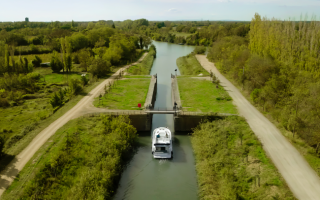France’s must-visit art museums and galleries
From Picasso to Monet, France has attracted many artists over the centuries and is now full of art museums and galleries – these are some of our favourites from across France that you should visit
Musée Toulouse-Lautrec
Albi, Occitanie
This museum is dedicated to the Albi-born painter Henri de Toulouse-Lautrec. Housed in the former Bishops’ Palace, a striking 13th-century fortress, the museum houses the world’s largest collection of works by the local artist – there are more than 1,000 on show here. Particularly eye-catching works on display include those of the Parisian underworld, with which the artist had a lifelong fascination, and Au Salon de la rue des Moulins, one of his most famous canvases.
Musée Matisse
Nice, Provence-Alpes-Côte d’Azur
Situated in the leafy Cimiez quarter of Nice, this museum is home to a wonderful assortment of works by Matisse, including oil paintings, drawings, sculptures, tapestries and paper cut-outs. Visitors will find the permanent collection in a red-ochre 17th-century villa, which used to house Queen Victoria on her winter trips to Nice, while temporary exhibitions take place in an ultramodern basement building. The great master himself, Matisse, is buried across the park from the museum in the Monastère Notre Dame de Cimiez cemetery.
_____________________________________________________________
Don’t miss:
French museums that fashion-lovers should visit
8 World War I museums to visit
_____________________________________________________________
Musée du Louvre
Paris, Île-de-France
No trip to Paris is complete without a stop-off at the 800-year-old Louvre, home to more than 35,000 exquisite treasures from across the world. On display here are western works of art from the Middle Ages until 1848 as well as collections from the Egyptian, Greek, Etruscan and Roman civilisations. Among the many masterpieces on display to the public are Leonardo Da Vinci’s Mona Lisa, the Ancient Greek statue of Venus de Milo and the Hellenistic sculpture, known as The Winged Victory of Samothrace.
La Piscine Musée d’Art et d’Industrie
Roubaix, Hauts-de-France
Positioned on the edge of France’s former textile capital Roubaix, this museum wins top marks for its setting; housed in a former art deco municipal swimming pool, it is home to an impressive collection of works relating to the applied arts (furniture, textiles, fashion) as well as paintings and sculptures from the 19th and 20th centuries. All the works are carefully arranged around a long, thin pool, a reminder of the building’s watery past.
Musée Fabre
Montpellier, Occitanie
Founded in 1825 by local painter François-Xavier Fabre, this superbly renovated museum in central Montpellier is home to one of France’s richest collections of European art. The galleries are divided into three main sections: Old Masters, Modern Movements and Decorative Arts, with works spanning the last 600 years of European artistic activity. There is a strong French artist contingent here and of particular local interest are the works by Marseille-born Frédéric Bazille and Rodez-born abstract artist, Pierre Soulages.
Musée Granet
Aix-en-Provence, Provence-Alpes-Côte d’Azur
Completely refurbished in 2007, this museum is home to nearly 12,000 paintings, sculptures and archaeological works. The paintings on display here include works from the 17th century French school, a collection featuring the works of Cézanne and Giacometti and many of the artists who came along in between. Cézanne enthusiasts can admire his works more closely in the special room dedicated to the iconic French artist, which features 9 large oil paintings. The museum’s collection also includes works from the European schools, with paintings by Rubens and Rembrandt.
_____________________________________________________________
Don’t miss:
17 things to do in Paris for families
12 classic French novels you should read
_____________________________________________________________
Musée des Beaux Arts André Malraux
Le Havre, Normandie
Facing the sea, this strikingly modern structure, consisting of transparent glass and steel positioned on a concrete pad, is home to the most extensive collection of Impressionist paintings in France outside of Paris. Works on display here include those by Monet (who grew up nearby), Pissarro, Renoir and Sisley. There are also paintings on show by Le Havre-born Fauvist artist Raoul Dufy, and Eugène Boudin, who mentored Monet.
Musée d’Art Moderne
Céret, Occitanie
Céret’s artistic credentials stretch back as far as 1910 when Catalan sculptor Manolo Hugué, painter Frank Burty Haviland and composer Déodat de Séverac all settled here. They were soon followed by the likes of Pablo Picasso and Georges Braque along with other leading figures from the cubist and Fauvist monuments. This Pyrenean town was a great source of inspiration for countless artists and the museum was created to house works by those who linked Céret to their artistic development. Today the museum boasts a vast collection of paintings from many leading artists, including 70 pieces donated by Picasso and paintings by Marc Chagall and Joan Miró.
Musée du Petit Palais
Avignon, Provence-Alpes-Côte d’Azur
Housed in a 14th-century building which stands close to the Palais des Papes, this museum boasts a rich collection of Renaissance paintings of the Avignon school. There is also a substantial collection of Italian artwork on display here, including paintings amassed by 19th-century art collector Giampietro Campana.
Musée Rodin
Paris, Île-de-France
Just a hop, skip and a jump away from the gold-domed Les Invalides lies the beautiful Hôtel Biron, an 18th-century mansion housing the works of master sculptor Auguste Rodin. Refurbished in 2015, the mansion – which was Rodin’s former workshop – showcases his vast collection of sculptures, sketches and paintings as well as pieces created by his mistress and muse, Camille Claudel. The hôtel particulier is surrounded by a large rose-filled garden, a tranquil place in the heart of Paris where you can contemplate Rodin’s big-name works including The Thinker, The Burghers of Calais and The Gates of Hell.
Centre Pompidou
Paris, Île-de-France
A radical architectural statement in the Beaubourg area of Paris’s 4th arrondissement, the Centre Pompidou houses galleries, cutting-edge exhibitions and entertainment venues. But the biggest draw to this futuristic building is the Musée National d’Art Moderne, France’s national collection of art dating from 1905 until the present day. Only a small percentage of the museum’s 100,000-piece collection is on display here, but a visit is definitely recommended if only for the breathtaking Paris panorama from the rooftop.
Musée des Augustins
Toulouse, Occitanie
Housed in a former Augustinian monastery, this museum specialises in fine arts with works spanning the Roman era right through to the early 20th century. The paintings on display here are from across France with impressive works by big French names such as Delacroix, Toulouse-Lautrec and Monet. Other museum highlights include the collection of sculptures representative of the local Occitan culture and a tranquil 14th-century cloister garden for you to soak up all the art.
Musée d’Art Moderne, d’Art Contemporain et d’Art Brut – LaM
Lille, Hauts-de-France
A mix of colourful, playful and somewhat obscure works from modern masters including Braque, Calder, Léger, Miró and Picasso are on display at this museum and sculpture park located in the Lille suburb of Villeneuve-d’Ascq. The museum’s main calling card is its exquisite collection of outside art (paintings produced by non-professional artists), with works by leading exponents of the movement including Aloïse Corbaz, Joseph Crépin and Auguste Forestier.
Musée des Impressionismes
Giverny, Normandie
Inaugurated in 2009, this relatively new museum – just 100m away from Monet’s house and gardens – holds two or three temporary exhibitions per year focussing on all aspects of Impressionism. Book in advance for the two-hour art workshops, which offer budding artists an introduction to watercolour, drawing and sketching.
Like this? You might also enjoy:
Visit France’s most unusual museums
Share to: Facebook Twitter LinkedIn Email


